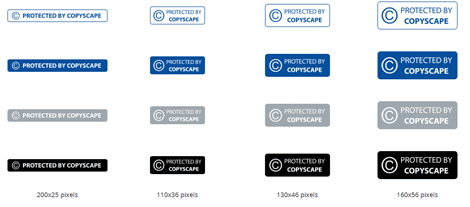Blogging can be difficult in itself without having to worry about plagiarism and content theft. Some people make it a habit to take other creators’ content, slap a couple of backlinks and sponsored referral links on it for good measure and publish it as their own.
It’s something that no professional service should tolerate, and while it’s hard to protect your blog from these individuals, there are certain steps you can take in order to make it harder for them to harm you in this way.
Types of Content Theft
Depending on the type of blog you are running, there are numerous instances in which your content can be taken without your notice. Some of these types of theft are blatantly obvious.
Others require a keen eye to spot similar content found on the web with only one of it being original:
- Written content theft – Simply copying and pasting your content to another platform.
- Visual content theft – Lifting images, videos and animation from your blog for reposting purposes.
- Posting without acknowledging – Even if a person takes your content and simply wants to use it for reference, they still have to attribute the original work to you.
- Plagiarism and ranking – Taking your content and optimizing the SEO so that it ranks better than the original, with professional help or individually.
Using Creative Commons (CC)
Creative Commons is a long-standing copyright licensing service that operates on the internet. They work to ensure that no content gets plagiarized or misused without the knowledge of the original owner.
That being said, obtaining a CC license is fairly easy and straightforward, requiring only a few minutes of your time.

You can set up the exact applications for your content to ensure that no party can ever use it without crediting you or using it in a way that you don’t want them to.
Putting a CC license on your content is free of charge and serves the purpose of protecting original authors.
It also exposes frauds who like nothing more than to take someone else’s work without any help from PhD writers or any professional effort put into it.
Disabling Content Selection
While it may not prevent anyone from writing down your content and manually copying it, disabling content selection goes a long way.
Many of the plagiarizing websites don’t bother with a manual copy, to begin with. Instead, they opt for script language and RSS feeds for their scraping efforts.
That being said, installing an official plugin that prevents content selection and protecting your content in this way can often make the difference.
Even if you had content written for you by a third party and are using a CC-licensed piece of content yourself, individuals who deal in scraping don’t care where the original content came from as long as they receive hits and ad revenue for their efforts.
Make their jobs harder by putting up copy barriers on your blog – your readers won’t know the difference anyway.
Searching Through Copyscape
Copyscape is an online service that stands for original content and content protection. You can easily use the search engine on their website to look for any traces of your content on the web.
By simply inserting your URL into the search field, you will give Copyscape all the information it needs to deduce whether or not your content is featured somewhere else on the web.
Even if you deal in abstract writing and provide professional writing services, these pieces of content can still be lifted and plagiarized in a matter of moments.

Copyscape also features paid subscription models that can offer automated around-the-clock surveillance of your content in order to ensure a high level of protection.
Decide on the amount of features you will use based on your personal needs. Many people are fine with simply using the search engine manually without employing any advanced features.
Watermarking Multimedia Content
One of the toughest parts of copyright protection is making sure that your images and videos don’t get featured somewhere without your permission.
You would be surprised to see how many people ignore CC licenses and claim content as their own, even if they do constant dissertation writing and know about copyright protection.
Watermarking your content might make it slightly less visually appealing, but you will be doing yourself a huge favor in protecting your original content:
- Putting your signature or logo at the bottom corner will help differentiate your content from someone else’s and stop plagiarism attempts.
- Using Google Alerts will make sure that you are notified of any content being lifted and used in improper ways.
- Grid-based patterns that go over your images or videos will make sure that no one can modify the content and remove them easily.
- Reducing the quality of featured images or videos will make the content unusable without your strict say so.
- Adding meta-data, alternate text or simply labeling your content will often confuse the automated scripts that look for content to lift.
Conclusion
Protecting your content online is sometimes nigh impossible. No matter what you do to copyright your content, there will always be someone with zero knowledge of how CC works and simply take anything they need from you.
The best thing you can do for yourself even if you are a thesis writer on demand is to keep close tabs on your content and do regular checks.
It’s often easier to simply shut down any online copies than to constantly try to protect your content from people who scrape blogs for a living.
All Images provided by the author under his or her own license.
Disclaimer: The views and opinions stated in this post are that of the author, and Return On Now may or may not agree with any or all of the commentary.
Angela Baker
Latest posts by Angela Baker (see all)
- Pros and Cons of a Single-page Website for #SEO - August 1, 2019
- How to Protect Your Blog Content From Being Stolen - September 28, 2017





